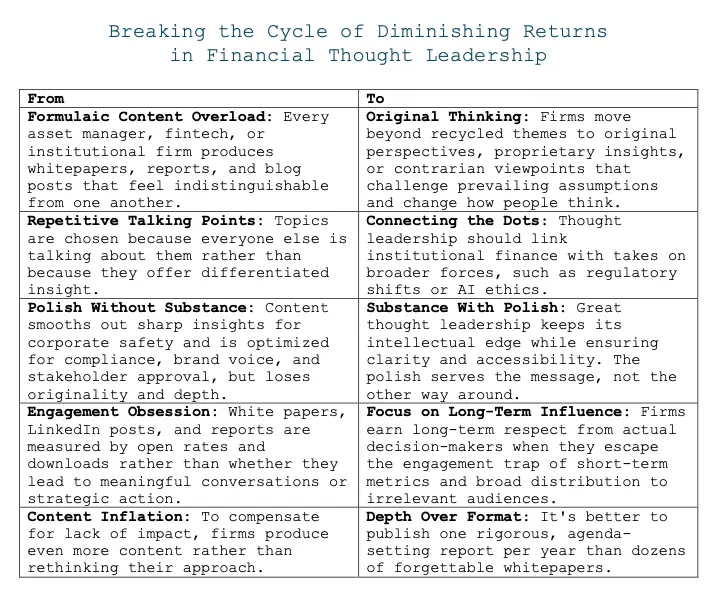Thought leadership should be fun, fast, and fearless. You tap into excitement about new ideas and advocate for something better. That’s the mindset behind The Idea Sled. Projects glide forward gracefully. It’s the momentum of commitment. This newsletter shows you how.
The content-industrial complex makes involution into a badge of honor. In the process, thought leadership and innovation get sucked into the muck. Because institutional finance and fintech are the backbone of the global financial system, stagnation has high costs, limiting opportunities and perpetuating deprivation.
The Concept of Involution
Involution, as defined in anthropology and sociology, refers to a system that becomes more intricate and effort-intensive but does not evolve in a meaningful way. It means working harder for weaker and weaker incentives with fewer and fewer results.
Societies fall into involution when they escalate effort and refine themselves internally without making external progress. Involution results in stagnation, diminishing returns, or self-perpetuation without fundamental transformation.
Symptoms include hyper-specialization and hyper-competition, unnecessary complexity, and a focus on shared expectations rather than genuine needs.
Content-Industrial Involution
It’s not hard to see self-referential involution all around us: performance over process, engagement over relationship, tactics over strategy, and emptiness over meaning. And nothing could be emptier than reducing ideas to the status of content, existing merely to fill an unfillable digital hole.
It didn’t seem to start that way. Content marketing seemed like it was about educating and engaging an audience through valuable insights. At least, that’s the story I told myself when I started working in it. But we’ve seen several shifts, and we’re on the cusp of those shifts pulling us all down into…well, drop the “f” from “the shifts.”
Three Turns of the Involution Screw
In the first turn, content marketing became a game of pointless optimization, degrading knowledge-sharing into over-engineered, repetitive tactics designed to beat algorithms and maximize reach—reach for reach’s sake. A few successful content marketers pioneer a framework, hack, or system that gets attention. Then, everyone chases after it, diluting its effectiveness. To stand out, marketers don’t innovate; they involute. They hyper-specialize, add more complexity, or package old ideas in new ways. It’s a race to nowhere.
In the second turn, content marketing finally reached that nowhere finish line. Instead of delivering fresh, insightful ideas, attention turns to teaching content creation for its own sake. Many who started as marketing experts shifted their focus to growing a following because that’s what gets the most engagement. They only influence each other, losing any ties to real-world business ideas. It spawns increasingly useless content—more tactics, fewer actual results.
The third turn is where we are now: generative AI. A formulaic content mentality is the exact premise that Gen AI fulfills. It promises to generate limitless content, ingesting and recirculating all the formulaic frameworks, hacks, hooks, and step-by-step tactics. But who actually wants limitless content? It’s simply a form of exhaustion as content collapses in on itself. That’s why creators are either shrieking or colluding.
Involution as a Knowledge and Organizational Problem
Marketing is everywhere in our current culture, whether as output from business marketers or in the self-packaging of individuals. That’s media. And if the medium is the message, what message are you sending when your medium is “content”?
This pervasiveness means that the involution of the content-mentality affects how people consume and produce knowledge. For businesses, the problem isn’t just involuted and ineffective content marketing. It contributes to a broader organizational malaise that suffocates communication and, ultimately, innovation.
When thought leadership is reduced to the least controversial insights, it reinforces a culture of risk avoidance where bold strategic moves are discouraged. Innovation slows down because nobody wants to challenge internal or external consensus. At best, thought leaders withdraw because projects feel like a treadmill rather than an accelerator of meaningful conversation.
From Involution to Innovation via Thought Leadership
Innovation is a form of evolution that counters involution. It adapts, transforms, and creates new value. It refers to the outside world instead of doubling down on existing systems and empty tactics.
And thought leadership acts as a direct antidote to content involution, provided, of course, that it can break out of the trap of involuted incentives (i.e., engagement metrics) and tepid, vapid practices.
Via thought leadership, innovative firms take a strong point of view—identifying emerging tensions, contradictions, and market asymmetries instead of summarizing what everyone already knows. They introduce and traverse new intellectual territory, not just map and narrate journeys through existing landscapes.
Moreover, the thought leaders and marketers I work with usually feel freer and more energized when they break away from reductive, uninspiring content-industrial dogma.
The High Stakes of Financial Innovation
Stifling innovation in financial services has higher stakes than just better writing and a healthier organization. It also suffocates economic growth and impedes the circulation of value. It also chokes the deployment of capital to positive outcomes for humans and ecosystems.
That’s why thought leadership in the industry matters. Hyper-optimization, diminishing returns, and self-referential content marketing suppress good thinking. They create organizational stagnation, stifling innovation, decision-making, and competitive advantage. They force thinking and thought leaders underground.
When a firm’s public messaging lacks depth, its internal culture follows suit, stifling innovation. It then becomes an industry-wide problem as shallow ideas propagate.
We can’t afford that.
Meanwhile, the financial institutions and fintech firms that resist involution and commit to real thought leadership will not only differentiate themselves in the market. They will also foster a culture of innovation, strategic foresight, and long-term success that can transform economic activity.


Three Grace Notes
“They all suspected, though they couldn’t really prove, that a good story was as foundational to that business as, say, a blast furnace was to a steel mill. But you could slap a white hard hat onto an investor and take him into the plant and let him verify that the blast furnace was still there. Whereas a fantasy world was—well—a fantasy world.” —Neal Stephenson, Reamde
“The extraordinary ability of the human brain to start sifting through a billion stored experiences the moment it senses trouble, picking out all that it needs, then combining and rearranging to reach a conclusion: only this managed to keep the institution afloat.” —Yoko Tawada, The Emissary
“A black hole is everything a star longs to be.” —Kara Walker, A Black Hole Is Everything a Star Longs to Be
Note: The links above are affiliate links. I’m using them in lieu of paid subscription tiers or digital tip jars. Seems like a much more graceful way to generate financial support while sharing more thinking and writing that can guide thought leadership.




